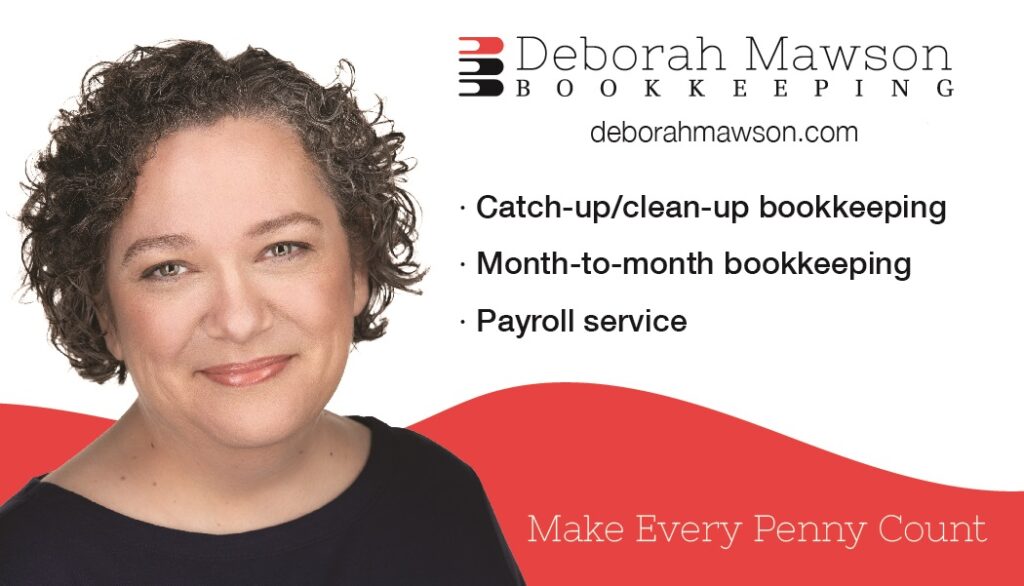Picture this: It’s a bustling Monday morning, and Joel, a seasoned landscaper, is gearing up for a packed week of client projects. As he reaches for his debit card to purchase supplies, he freezes. Panic sets in as he realizes he accidentally used his personal card for a substantial business expense last Friday. Thoughts of untangling this bookkeeping nightmare consume him, threatening to derail his carefully planned schedule.
“Joel” is a fictional character who represents so many of my contractor clients. Situations like Joel’s are all too common among contractors and small business owners. The lines between personal and business finances blur, leading to confusion, wasted time, and potential legal and tax implications. But what if there was a simple solution that could prevent these headaches and set your business up for success?
Enter the business bank account—a crucial tool for contractors looking to streamline their financial management and establish a professional foundation. In this post, we’ll explore the key benefits of separating your business and personal finances, walk through the factors to consider when choosing a bank, and share insights from Joel’s journey to find the perfect account for his landscaping venture.

Why You Need a Separate Business Bank Account
As Joel learned the hard way, blending personal and business finances can lead to a tangled mess of transactions, making it difficult to track expenses, manage cash flow, and prepare for tax season. By opening a dedicated business bank account, contractors like Joel can unlock a host of benefits that streamline financial management and support long-term growth.
Firstly, separating your business and personal finances is crucial for maintaining accurate records and simplifying bookkeeping. With a clear divide between the two, you can easily track income and expenses, monitor cash flow, and generate financial reports that provide valuable insights into your business’s health. This clarity not only saves time and reduces stress but also equips you with the data needed to make informed decisions and plan for the future.
Moreover, a business bank account enhances your professional image and credibility with clients, suppliers, and partners. When you write checks or make payments from a dedicated business account, it demonstrates that you take your venture seriously and value transparency. This professionalism can help build trust, foster long-lasting relationships, and even open doors to new opportunities.
But perhaps most importantly, maintaining a separate business bank account is essential for legal and tax purposes. Commingling personal and business funds can create a host of legal issues, including the potential loss of personal liability protection. By keeping your finances distinct, you can safeguard your personal assets and simplify tax reporting, ensuring compliance with federal and state regulations. It also will save you money with legal and accounting fees.
Factors to Consider When Choosing a Bank
With the importance of a separate business bank account established, let’s dive into the factors contractors like Joel should consider when selecting a banking partner. Not all banks are created equal, and finding the right fit for your construction business can make a world of difference in terms of financial management and growth.
First and foremost, seek out banks that specialize in serving small businesses, particularly those with experience in the construction industry. These institutions understand the unique challenges and needs of contractors, and can offer tailored solutions and expert guidance. From specialized accounts and lending options to industry-specific resources and networking opportunities, a bank well-versed in construction can be an invaluable ally.
Next, carefully evaluate the fees and service charges associated with each bank’s business accounts. While some fees may seem minimal, they can quickly add up over time, eating into your profits and hindering growth. Look for banks that offer transparent pricing, competitive rates, and waived fees for meeting certain balance or transaction thresholds. Don’t hesitate to negotiate or shop around to find the most cost-effective option for your business.
Accessibility and convenience should also be top priorities when choosing a bank. As a busy contractor juggling multiple projects and client demands, you need a banking partner that fits seamlessly into your schedule. Seek out institutions with robust online and mobile banking platforms, allowing you to manage your finances on the go. If you frequently deal with cash or checks, consider banks with branches or ATMs conveniently located near your job sites or suppliers.
Finally, if you plan to work with a bookkeeper or accountant, it’s crucial to choose a bank that can grant them read-only access to your account. This feature allows your financial professional to view your transactions and statements without the ability to make changes or initiate transfers. Read-only access streamlines the bookkeeping process, enabling your bookkeeper to efficiently categorize transactions, reconcile accounts, and generate reports. Plus, it provides an added layer of security, ensuring that your sensitive financial information remains protected while still allowing for seamless collaboration with your trusted advisors.
Additional Services That Benefit Construction Businesses
Beyond the basics of checking and savings accounts, many banks offer a range of additional services that can provide significant value to construction businesses. As Joel explored his options, he discovered several key offerings that could help streamline operations, improve cash flow, and support his long-term growth objectives.
One such service is access to credit options, such as business lines of credit or equipment financing. These flexible funding solutions can be a lifeline for contractors, providing the capital needed to purchase materials, cover payroll, or invest in new machinery.
By partnering with a bank that understands the ebbs and flows of the construction industry, you can secure the financing you need to take on larger projects, smooth out cash flow gaps, and seize growth opportunities as they arise.
Another valuable service to look for is merchant services, particularly mobile payment solutions. In today’s fast-paced, digital world, clients increasingly expect the convenience of paying by credit card or mobile wallet. By utilizing your bank’s merchant services, you can accept payments easily on job sites, reducing the risk of late or missed payments and improving your cash flow. Plus, with transactions directly linked to your business bank account, you can streamline your bookkeeping and save valuable time.
Finally, don’t overlook the importance of financial education and support. Many banks offer workshops, seminars, and online resources specifically tailored to small business owners. These educational opportunities can provide invaluable insights into financial management, tax strategies, and growth planning. By taking advantage of these resources, contractors like Joel can gain the knowledge and skills needed to make informed financial decisions and drive long-term success.
How to Set Up Your Business Bank Account
Now that you’ve identified the right bank and services for your construction business, it’s time to take the plunge and set up your account. While the process may vary slightly from bank to bank, there are some common steps and requirements to keep in mind.
First, gather all the necessary documentation. This typically includes:
- Your business formation papers (e.g., articles of incorporation or LLC formation documents)
- Employer Identification Number (EIN)
- government-issued photo ID
- Some banks may also require additional information, such as a business license, proof of address, or minimum opening deposit.
Next, decide on the specific type of account that best suits your needs. Most banks offer a range of business checking and savings options, each with varying features, fees, and balance requirements. Consider factors such as your average monthly transactions, expected account balance, and the need for specialized services like merchant processing or online invoicing. Don’t hesitate to ask questions or seek guidance from the bank’s business banking specialist.
Once you’ve chosen your account type and gathered your documents, it’s time to complete the application process. Many banks now offer online applications for convenience, but you may prefer to visit a branch in person to ask questions and establish a personal relationship with your banker. Be prepared to provide details about your business, such as its entity (sole proprietor, partnership, S-Corp. C-Corp, or nonprofit), legal structure, industry, and anticipated transaction volume.
The Role of a Virtual Bookkeeper in Managing Your Business Bank Account
With your new business bank account up and running, you might consider enlisting the help of a virtual bookkeeper to take your financial management to the next level. These professionals can work seamlessly with your banking data to streamline your bookkeeping, provide valuable insights, and keep your finances organized and tax-ready.
By granting your virtual bookkeeper secure access to your business bank account, they can automatically import transactions, categorize expenses, and reconcile statements. This not only saves you countless hours of manual data entry but also ensures that your financial records are accurate and up to date. With a clear, real-time picture of your cash flow and financial position, you can make informed decisions and avoid costly mistakes.
Moreover, a skilled virtual bookkeeper can provide regular financial reports and analysis, helping you identify trends, spot opportunities, and address challenges proactively. They can offer guidance on everything from budgeting and forecasting to tax planning and compliance. By leveraging their expertise and insights, contractors like Joel can gain a deeper understanding of their financial performance and make strategic moves to drive profitability and growth.
By partnering with me as his virtual bookkeeper, one of my clients (we’ll call him “John”) was able to catch fraud on his bank account early. Since he hired me to review his accounts on a monthly basis, I caught something that looked off. I alerted John immediately, questioning the validity of the transaction. John was able to fix the problem with his bank before his hard-earned money disappeared. If John had waited to do the bookkeeping himself, he would have missed the window to retrieve the money he lost.
Laying the Foundation for Financial Success
Choosing the right bank account is a critical step in setting your construction business up for long-term financial success. By separating your personal and business finances, you can streamline your bookkeeping, enhance your professional image, and ensure compliance with legal and tax requirements. But the benefits don’t stop there.
As Joel discovered on his journey, partnering with the right bank can unlock a world of opportunities for your business. From specialized accounts and services to industry-specific resources and support, a bank that understands the unique needs of contractors can help you navigate the complex financial landscape and achieve your growth objectives.
By taking the time to carefully evaluate your options, considering factors such as fees, accessibility, and additional services, you can find a banking partner that not only meets your needs but also empowers you to thrive. And with the support of a skilled virtual bookkeeper, you can take your financial management to the next level, gaining valuable insights and freeing up time to focus on what you do best—building your business and serving your clients.
So, whether you’re just starting out or looking to take your construction venture to new heights, remember the importance of a solid financial foundation. By choosing the right bank account and surrounding yourself with the right financial professionals, you can lay the groundwork for a prosperous future and construct a legacy that will stand the test of time.
Ready to build a strong financial foundation for your construction business? Schedule a free, no-obligation consultation with me today and discover how my expert guidance and tailored solutions can help you achieve your goals. Contact me to learn more!



